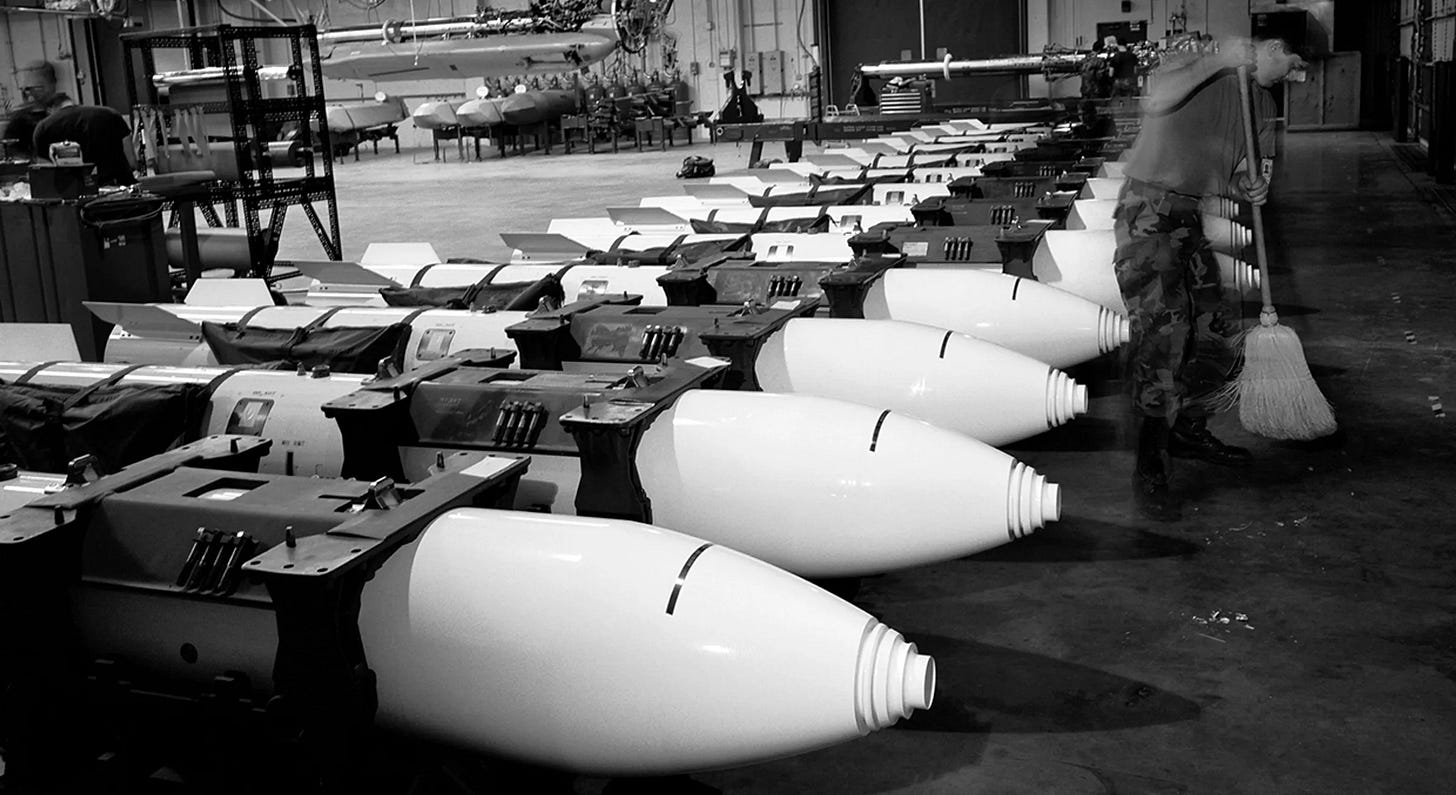Rebuilding Community Is Like Nuclear Disarmament: A Letter to Sara
A letter exchange between Sara Ness and Andrew Perlot on obligations, individualism, and threading the needle.
I was happy to stumble on ’s Substack after losing track of her for years. We met in 2013, when she was running an Austin Relating Games group, and I’ve always been impressed with her thoughtful ideas about communication, connection, and community. We’ve decided to exchange some letters about overlapping interests, and we’ll continue as long as we and our subscribers enjoy it. Let us know what you think.
Dear Sara
Rebuilding community from the fractious status quo is like nuclear disarmament.
I thought this while reading your article on balancing personal desires and community well-being in a world where individualism has swept the field.
You did a good job summing up the situation:
“In a society that thinks of every individual priority as “self-care” and any concession as “self-sacrifice”, how do we learn to see prosociability as a positive value, without becoming martyrs to the common good?”
A similar dynamic reigned between the Soviet Union and the US during the Cold War. It was commonly acknowledged that having less potential to wipe all life from the face of the earth was a good thing, just as today many think individualism has gone too far and society is paying the price.
Today, no one wants to be the prosocial “martyr” who’s taken advantage of while everyone else “self-maxes”. And the cold warriors didn’t want to unilaterally disarm — the risk of being obliterated by a better armed opponent was real.
The solution — implemented gradually over decades — started from very modest beginnings.
First, let’s agree to not detonate nuclear bombs in the atmosphere or our oceans (1963).
Then, let’s agree to not spread nuclear weapons to other countries (1968).
And by the time you got to the 1970s and 1980s, they were limiting or eliminating a wide range of missiles and bomb types.
Gradually, the threat of nuclear annihilation began to recede. Norms around nuclear weapon use (don’t) and rhetoric about threatening their use (don’t) began to change.
But it only worked because each country agreed to open up to an almost claustrophobic level of military monitoring by the other side. Inspectors were sent in to make sure each side kept their side of the bargain. An entire monitoring apparatus was erected to pull this off, and neither side liked it.
The Clostrophic Small Town:
Have you ever been immersed in small-town life? Clostrophobic, in-your-business small towns are half extinct in the US, but they still exist abroad.
I’ve been lucky enough to travel widely, collectively spending years overseas in countries where traditional communalism still reigns and the clostrophobia (outside large cities) is still very much in evidence.
You’re being watched, and that has upsides and downsides. It means that if you’re sick or sad or lose your job, your community is paying attention and ready to step in and help. But it also means they’ll be ready to pounce when your individualism clashes with their sense of propriety and morals.
Remind me to tell you how I got in trouble in Cambodia for failing to sweep the communal sidewalk when it was my turn three weeks in a row. Those old Caombodian ladies were pissed! They liked their sidewalks clean, and didn’t like the foreigner who didn’t prioritize their priorities. And if I’m being honest, that was the problem. I forgot not because I didn’t intend to do it, but because deep down I thought sweeping outdoor sidewalks was a silly waste of time and gave it no thought at all. I usually remember to do what I find important, and sidewalk sweeping will likely never be a big priority for me.
And so we see the problem. Arriving at a macro-level consensus about what standards of “group maxing,” are appropriate and what kinds of individual choice we should reign in for the collective is very hard. Traditionally, they were dictated by religion and tradition more than negotiation. And even if we manage to agree in theory that certain standards are good, follow-through will be a challenge. How many want to subject themselves to this level of scrutiny as society gets more experimental with its relationships and personal life than ever before?
In “The Righteous Mind,” psychologist Jonathan Haidt describes a “red pill moment,” where he recognized the “possibility that there were alternative moral worlds in which reducing harm (by helping victims) and increasing fairness (by pursuing group-based equality) were not the main goals.” He came to that conclusion while studying the morality of non-Western cultures.
A return to macro-communalism might require a shift like this, and I’m not sure how we get there.
Think about every long-term, successful communal structure in the modern world. They’re either large in scope and rely on bureaucracy, monitoring, and enforcement, or they’re driven by idealists who drink the Kool-Aid.
Israel’s socialist kibbutzes are a great model of the later. Members who’d do better making their own way in the world willingly sacrifice their “self-maxing,” for the good of a whole, papering over a lack of ability and drive in the rest. They do this because they believe in the Kibbutz's mission. Little monitoring is necessary because they know it’s right, so they willingly put themselves in harness and pull.
Willing Martyrs
Your write:
“How do we negotiate our own inner complexity, such that we can make choices about what morality, needs, and community to prioritize?”
I think we need to start with a belief that some things objectively matter and are not relative. If we can’t get that far, we’re not going anywhere. It’s one thing to say we value community, but if there’s no underlying — perhaps for some even transcendent — why, butressing community alruism, that support tends to disintegrate as soon as it’s inconvenient or effortfull to maintain.
Unfortunately, nihilism has become pretty popular and uncontroversial. Many people have no why at all in their lives.
I’ve written how many “spiritual” people who won’t willingly handcuff themselves end up destroying themselves in the end. We all need some restraints and beliefs about what matters for our day-to-day life.
This is why I find having a philosophy of life so valuable. It’s a lens I’ve examined thoroughly, which I can use to interpret the world and my actions.
A major part of my cobbled-together philosophy of life is a stolen paradox — virtue is the only good. I happen to believe virtue makes you happy, which I know is a big claim.
The nice thing about it is that it’s good in and of itself — No reciprocity required. I don’t need to wait for mutual “self-maxing” disarmament to act.
The philosopher Marcus Aurelius put it this way:
“Some people, when they do someone a favor, are always looking for a chance to call it in. And some aren’t, but they’re still aware of it—still regard it as a debt. But others don’t even do that. They’re like a vine that produces grapes without looking for anything in return.
A horse at the end of the race …
A dog when the hunt is over …
A bee with its honey stored …
And a human being after helping others.
They don’t make a fuss about it. They just go on to something else, as the vine looks forward to bearing fruit again in season.We should be like that. Acting almost unconsciously.”
— Marcus Aurelius, Meditations, 5.6
Since I prize justice, and am looking to execute on that, I often ask myself how I should balance community-maxing with self-maxing. This has resulted in me doing more volunteer work, and finding various ways to “give back.” But, notably for our purposes, it hasn’t brought me toward communal living and being the kibbutz type. Why? I’ve come to a very ancient conclusion.
Wise people of East and West have often insisted that the majority make big mistakes, and are making themselves miserable.
Shakespeare: “Lord, what fools these mortals be! (Midsummer Night’s Dream)
Seneca: “What fools these mortals are!” (Letters, 1)
The Bible: “The number of stupid people is infinite (Ecclesiastes 1:15).”
The Upanishads: "Fools, dwelling in ignorance, yet imagining themselves wise and learned, go round and round deluded like the blind led by the blind." (1.2.5)
The Dhammapada: "Blind is this world; few are those who see clearly. As birds escape from a net, few go to a good realm." (174)
I’m not going to help idiots idiot harder, and some forms of community support would do exactly that. And so I need to walk a tightrope — doing good in alignment with my values and not giving of myself unconditionally. I’m applying judgment to others and helping them only in certain avenues I align with, which is another taboo in today’s world. And anyway, our beliefs of this kind are personal. They can’t the scaled — people need to get to their beliefs in their own way. So we need to find a different way to scale if we want to prop up communalism and community.
A Happy Middle?
So we’ve outlined the ends of a spectrum:
Enforced bureaucratic communalism and social welfare programs.
?
What we’ll willingly do as individuals because we believe in it and find it important. Those who have imbided a certain brand of Kool-Aid are on board for certain kinds of altruism and self-sacrifice for the greater good, but probably different versions of it.
But do you think there’s anything in the second spot, one that avoids the “nuclear disarmerment problem”? Is there something beyond the individual, but short of a top-down imposition where local-level communalism can sprout up and thrive, despite differences and our individualist culture? What does that look like?
I’m eager to hear your thoughts, or where you think I’ve gone astray in my assessment.
— Andrew
Thanks for reading Socratic State of Mind.
If you liked this article, please like and share it, which helps more readers find my work.







